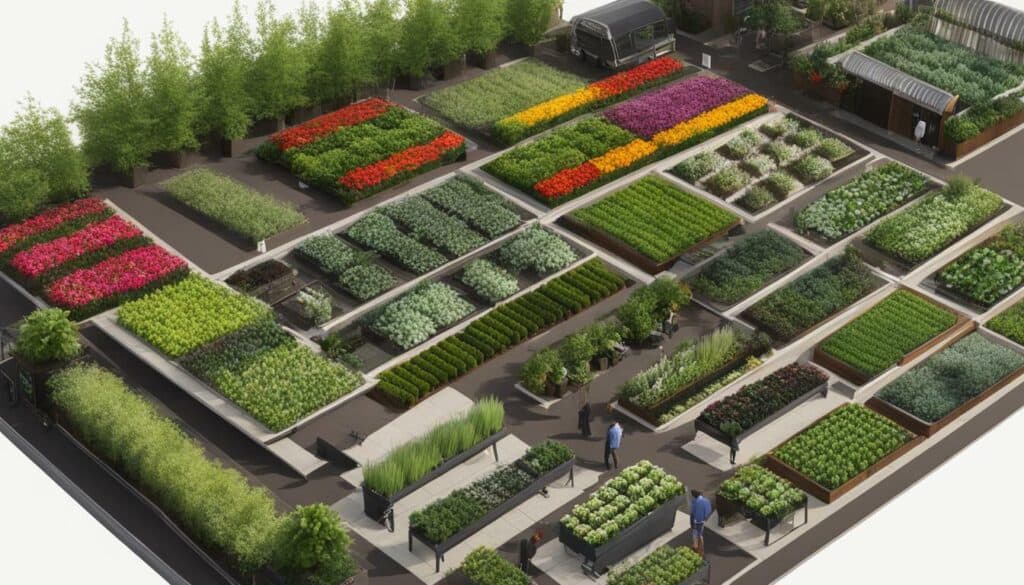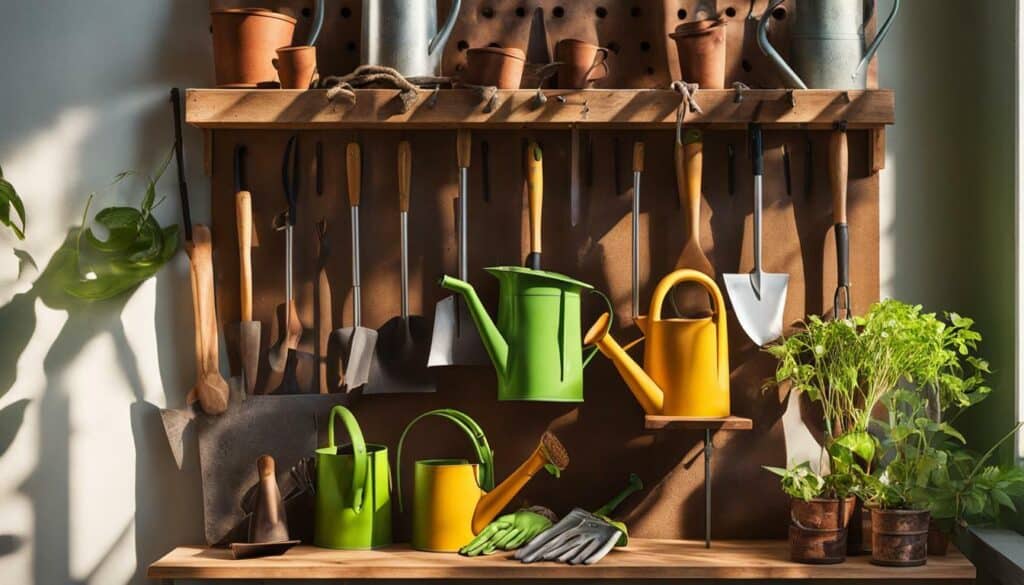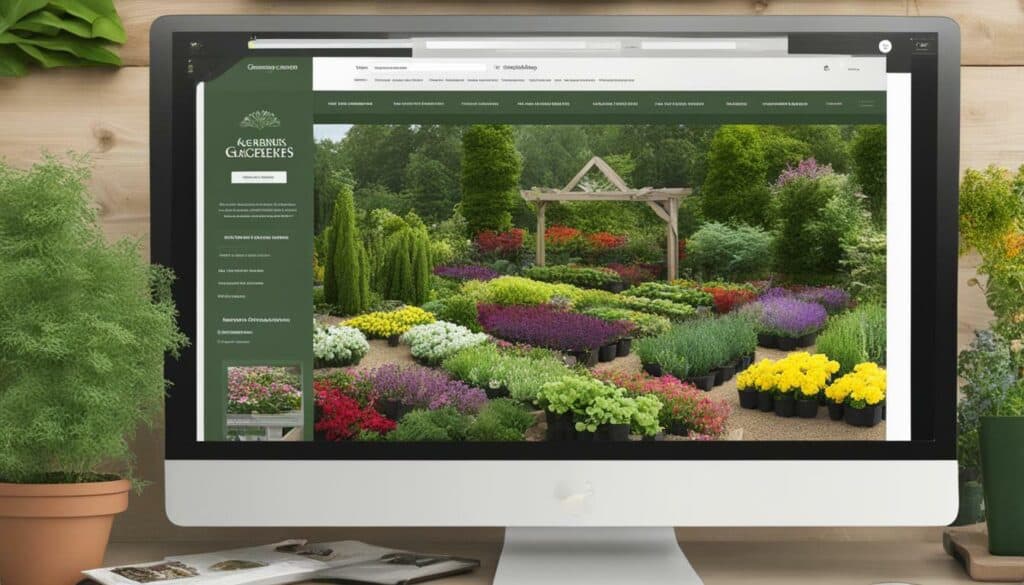Starting a gardening center business may not jump out at you as a business that’s going to bring a windfall. But the statistics regarding the evolution of the garden retail sector tend to say otherwise. The garden center industry has experienced significant growth, fueled by the increasing interest in home gardening and the popular home gardening trend.
The U.S. Census Bureau reports that retail sales of building and gardening materials have increased 8.6 percent since the spring of 2020, highlighting the profitability and potential of the industry. This surge can be attributed to the fact that many people, while staying at home due to the pandemic, have turned to gardening as a way to relax and keep busy. The gardening trend has not only sustained itself but has also continued to grow even before the outbreak of COVID-19.
In fact, average sales revenue for the home gardening industry has almost doubled from 4.62% in 2018 to nearly 8.79% in 2020, showing a consistent upward trend. This growth is further reflected in the increasing presence of passionate amateur gardeners on social media platforms, such as Facebook groups and Instagram pages, where they connect with like-minded individuals and share their gardening experiences.
Starting a garden center business today presents a great opportunity for success. The potential for profit, coupled with the growing interest in gardening, makes it an attractive venture. So, if you’re wondering how to start a garden center and achieve success, this guide is here to help you on your journey.
Key Takeaways:
- Despite initial impressions, starting a garden center can lead to significant profitability.
- The gardening industry has experienced consistent growth, driven by the popularity of home gardening.
- Retail sales of building and gardening materials have increased 8.6 percent since 2020.
- The trend of home gardening started before the COVID-19 pandemic, and its growth has been sustained.
- Passionate amateur gardeners have formed communities on social media platforms, showcasing the increasing interest in gardening.
Garden Center Essentials: Setting Up Your Business for Success
The success of a gardening business depends mainly on the characteristics that make it different from other gardening services. As you embark on your journey to start a garden center, it’s important to understand the key elements that will contribute to your success. From the gratifying nature of nurturing living things to the excellent profit margins on plants, there are many benefits to starting a garden center business. Here are some essential garden center essentials and tips to help you get started.
The Benefits of Starting a Garden Center Business
Starting a garden center business offers a range of benefits that make it an attractive venture. One of the most gratifying aspects of this business is the ability to nurture living things and witness their growth and beauty. Whether you’re growing flowers, vegetables, or herbs, the joy of seeing your plants flourish is unparalleled.
Additionally, garden centers enjoy excellent profit margins on plants. With the increasing interest in home gardening, the demand for plants has soared. This presents a significant opportunity to capitalize on the market and generate substantial revenue. By offering a wide variety of high-quality plants and providing expert advice, your garden center can become a go-to destination for plant enthusiasts.
Furthermore, a garden center provides a unique and enjoyable shopping experience for customers. Unlike traditional retail stores, garden centers offer a serene and green environment, allowing customers to connect with nature. This ambiance creates a sense of relaxation and inspiration, making the shopping experience more enjoyable.
In terms of equipment, there are a few essential items you’ll need to start your garden center. Basic gardening tools such as shovels, trowels, and pruners are necessary for various tasks, including planting, trimming, and maintaining plants. Wheelbarrows are useful for transporting soil, plants, and other materials, while forklifts can assist with heavier lifting and organizing inventory.
If you plan to offer delivery services or have a larger operation, trucks and delivery vehicles may be necessary for transporting plants and other landscaping materials. These vehicles allow you to serve customers who may not have the means to transport large items themselves and expand your customer base.
It’s important to consider the scale of your operation when acquiring garden center equipment. Renting or financing equipment initially can help manage costs, especially if you’re just starting. However, as your business grows, it’s advisable to invest in purchasing the necessary tools and equipment to streamline your operations and enhance efficiency.
“Starting a garden center business provides the opportunity to nurture living things, enjoy excellent profit margins, and create a unique shopping experience for customers. With the right equipment and a well-planned business strategy, your garden center can flourish in the growing market.”
| Garden Center Essentials | Estimated Costs |
|---|---|
| Basic Gardening Tools | $50 – $200 |
| Wheelbarrows | $50 – $150 |
| Forklifts | $5,000 – $15,000 |
| Trucks | $20,000 – $40,000 |
| Delivery Vehicles | $10,000 – $30,000 |
By having the necessary garden center equipment, you’ll be well-prepared to serve your customers and provide a seamless shopping experience. Remember to consider the specific requirements of your business and tailor your equipment choices accordingly.
“Equipping your garden center with essential gardening tools, wheelbarrows, forklifts, trucks, and delivery vehicles is crucial for providing excellent customer service and maintaining efficient operations.”
In Conclusion
Starting a garden center business offers a rewarding and profitable opportunity in the growing market. With the right combination of garden center essentials, expert knowledge, and a well-planned business strategy, you can create a thriving garden center that attracts loyal customers and generates substantial revenue.
Take the time to invest in high-quality gardening tools and equipment that will meet the needs of your operation. By providing a unique shopping experience, nurturing living things, and offering expert advice, your garden center can become a go-to destination for plant enthusiasts in your community.
Remember, the success of your garden center depends not only on the physical elements but also on your passion and dedication to creating a welcoming and inspiring environment for customers. Embrace the opportunity to start a garden center business and contribute to the growing trend of home gardening.
Steps to Start a Gardening Business
Before you consider starting a gardening business, it’s essential to know what the job requires and what to expect. The success of a gardening business depends on several factors, including physical labor, seasonal demand, specialized knowledge, and market research. Here are the key steps to follow when starting a gardening business:
1. Plan Your Business
Plan your gardening business in advance to ensure a smooth and successful launch. Start by educating yourself about the different aspects of gardening, such as plant growth times, sun and water requirements, and nutrient needs. By planning in advance, you can create a schedule for planting and harvesting, as well as visualize your garden layout. Consider using graph paper to lay out your garden by zones and allocate space for each type of plant.
2. Start Small and Manage Expectations
Starting small is advisable for beginners in the gardening business. It allows you to manage your time, resources, and expectations effectively. Remember that gardening is a journey, and it takes time to learn and improve your skills. Celebrate your successes and learn from your challenges along the way. Each season presents new opportunities for growth and learning.
3. Pick a Suitable Location
Choose the type of garden that suits your space and preferences. Options include in-ground gardens, raised beds, and container gardens. Containers of different sizes can be used for portability and flexibility in your garden. You can repurpose items you already have at home, such as old water jugs or egg crates, as containers. Raised beds are ideal for maximizing space utilization and making gardening more accessible. Consider your physical capabilities and the availability of space when deciding on the type of garden.
4. Select the Right Plants
Based on the available space, sunlight, and growing season, choose plants that are suitable for your garden. Consider your personal preferences and the preferences of your target market if you plan to sell your produce. Start with plants that are easier to grow and maintain, and gradually expand your selection as you gain more experience. Research which plants thrive together and practice companion planting to benefit from the mutual support and protection provided by certain plant combinations.
5. Prepare the Soil
Soil preparation is crucial for the success of your garden. Ensure that the soil has proper drainage and the right balance of nutrients. Plan for water availability and sunlight exposure in your garden. If your soil quality is poor, consider adding natural fertilizers, such as compost or chicken manure, to enrich it. Take care to protect your garden from pests and weeds, as they can hinder the growth of your plants.
6. Plan for Pollinators
Create a pollinator-friendly garden by planting native species, avoiding the use of pesticides, and providing additional food sources for pollinators. These can include hummingbird feeders or salt licks. Avoid hybrid flowers that may lack the necessary elements, such as pollen and nectar, for attracting pollinators. By attracting pollinators, you can enhance the productivity and health of your garden.
7. Plant Your Garden
Lay out your garden according to your planned design. Consider the space required by each plant when fully grown and provide adequate support, such as stakes or trellises, for plants that need it. Take measures to protect your garden from pests, birds, rabbits, and even your own pets. Visualize your garden layout using flour or other markers before breaking ground to ensure proper spacing and organization.

By following these steps, you can start your gardening business on the right track. Remember to constantly educate yourself, adapt to challenges, and enjoy the rewards of growing a successful garden.
Conducting Market Research
Before starting any business, it’s essential to conduct market research to ensure demand for your niche and analyze competition. Market research plays a crucial role in understanding your target audience, identifying competitors, setting fair prices, implementing an effective marketing strategy, and offering tailored services to meet customer needs. By conducting thorough market research, you can make informed decisions and increase the chances of success for your garden center business.
Market research provides valuable insights into the demand for gardening products and services in your area. It helps you understand the preferences and needs of your target audience, allowing you to tailor your offerings to meet their expectations. Through market research, you can identify potential gaps in the market and develop unique selling points that set you apart from competitors.
One of the key aspects of market research is analyzing your competitors. By studying their offerings, marketing strategies, pricing, and customer satisfaction levels, you can gain a competitive edge. Understanding what your competitors do well and where they fall short can help you position your garden center to attract customers and capture market share. Additionally, by identifying niche markets or underserved customer segments, you can carve out a unique space for your business.
Market research also enables you to set fair prices for your products and services. By studying the pricing strategies of your competitors and evaluating the perceived value of your offerings, you can determine the optimal price points that attract customers while ensuring profitability for your garden center. It’s important to strike a balance between competitive prices and adequate profit margins.
Furthermore, market research helps inform your marketing strategy. By understanding the demographics, preferences, and behaviors of your target audience, you can craft compelling marketing messages and choose the most effective channels to reach potential customers. Whether it’s through social media advertising, local print publications, or targeted online marketing, market research ensures that your marketing efforts are targeted and cost-effective.

In conclusion, conducting thorough market research is essential for starting a successful garden center business. It provides valuable insights into the demand for your niche, helps you analyze competitors, set fair prices, implement effective marketing strategies, and tailor your offerings to meet customer needs. By investing time and effort into market research, you can position your garden center for success in the competitive gardening industry.
Developing a Business Plan
The business plan for your garden business should include the following elements:
- An executive summary of the company: Provide an overview of your garden center business, including its mission, vision, and core values. This section should highlight the unique selling proposition and key differentiators of your business.
- Your goals, vision, and values for the business: Clearly define the long-term goals and vision for your garden center. Outline the values that guide your business decisions and shape the customer experience.
- Your target market and the type of service you plan to offer: Identify your target audience and understand their needs, preferences, and buying behaviors. Determine the specific products and services you will offer to meet their demands.
- Initial set-up costs and sales projection: Determine the initial costs required to set up your garden center, including expenses for purchasing or leasing a property, renovating the space, acquiring equipment and inventory, marketing and advertising, and hiring employees. Create a sales projection based on market research and competitive analysis to estimate your revenue potential.
- Equipment required: List the specific gardening tools, equipment, and vehicles you will need to operate your garden center. This can include basic gardening tools, wheelbarrows, forklifts, trucks, and delivery vehicles. Consider whether you will purchase, rent, or finance the equipment initially and plan for future expansion as your business grows.
- Your staff, including their experience and qualifications: Outline the roles and responsibilities of each member of your team, including their qualifications, experience, and areas of expertise. Define the organizational structure and communication channels to ensure efficient operations and excellent customer service.
- Your detailed marketing strategy and sales pricing: Develop a comprehensive marketing strategy to promote your garden center and attract customers. This can include online and offline advertising, social media marketing, content marketing, partnerships with local businesses or organizations, and customer loyalty programs. Set competitive pricing for your products and services based on market analysis and your business objectives.

By including these elements in your business plan, you will have a clear roadmap for the success of your garden center. It will help you make informed decisions, stay focused on your goals, and effectively communicate your vision to stakeholders.
Choosing a Business Structure and Obtaining Licenses
You cannot provide services or products as a business without having done so. Therefore, you must decide whether you want to establish yourself as a sole proprietor, partnership, or limited liability company.
Choosing the right business structure is an essential step in starting a garden center. Each structure has its own advantages and disadvantages, so it’s important to carefully consider which one aligns with your goals and needs.
Sole Proprietorship
A sole proprietorship is the simplest and most common business structure. As a sole proprietor, you have complete control over your garden center and its operations. You are personally liable for all business debts and legal obligations. This structure is suitable for small-scale garden centers or individuals starting out on their own.
Partnership
A partnership is formed when two or more individuals share ownership of a garden center. Each partner contributes capital, skills, or labor to the business. Partnerships are flexible and allow for shared decision-making and financial responsibilities. However, it’s important to have a partnership agreement in place to outline roles, responsibilities, and profit-sharing arrangements.
Limited Liability Company (LLC)
An LLC provides a blend of partnership and corporation advantages. It offers personal liability protection to its owners (known as members) while allowing for flexibility in management and profit distribution. Forming an LLC requires filing specific documents with the state and paying the necessary fees. It’s a popular choice for garden centers looking for liability protection and a formalized structure.
Once you have decided on the business structure, there are additional legal considerations to address. Trademarking your business name is crucial to protect your brand and prevent future legal conflicts. You can check the availability of your chosen name on the United States Patent and Trademark Office website.
Next, obtaining a business license is essential to operate your garden center legally. The requirements for licenses and permits may vary depending on your location, so it’s important to research the specific regulations in your state, municipality, or county. Most likely, you’ll need a general business license and, if you plan to have a physical store, zoning and sign permits may also be required.
Business insurance is another critical aspect of protecting your garden center. A comprehensive liability insurance policy will safeguard you in the event of accidents, injuries, or damages related to your business operations. You may also need to provide workers’ compensation insurance for your employees, even if they are temporary or part-time workers.
In summary, choosing the right business structure and obtaining the necessary licenses and permits are important steps in starting a garden center. Whether you opt for a sole proprietorship, partnership, or limited liability company, it’s crucial to protect your business name through trademarking and ensure compliance with local regulations. Additionally, securing the right business insurance will provide peace of mind and protect your garden center from potential liabilities.
Gardening Tools and Equipment
Starting a gardening business requires specialized tools and transportation. Here are some essential gardening tools and equipment that you’ll need to successfully run your garden center:
- Gardening Tools: Basic gardening tools are a must-have for any garden center. These include items such as shovels, rakes, hoes, pruning shears, watering cans, and gloves. These tools will be essential for tasks like soil preparation, planting, pruning, and maintenance.
- Wheelbarrows: Wheelbarrows are incredibly useful for hauling soil, mulch, plants, and other heavy materials around your garden center. They make transportation much easier and can save you time and effort.
- Forklifts: Forklifts are essential for moving heavy pallets of plants, soil, and other supplies. They can help you streamline your operations and make loading and unloading much more efficient.
- Trucks: Having a truck or two can be beneficial for transporting larger plants and equipment to and from your garden center. Trucks provide a versatile and reliable means of transportation for your business.
- Delivery Vehicles: If you offer delivery services to your customers, having a dedicated delivery vehicle or vehicles can be a game-changer. This allows you to provide a convenient and efficient delivery service, which can attract more customers.

Table: Essential Gardening Tools and Equipment
| Tool | Description |
|---|---|
| Gardening Tools | Shovels, rakes, hoes, pruning shears, watering cans, gloves, etc. |
| Wheelbarrows | For hauling heavy materials around the garden center. |
| Forklifts | For moving heavy pallets of plants and supplies. |
| Trucks | For transporting larger plants and equipment. |
| Delivery Vehicles | For providing convenient delivery services. |
“Having the right tools and equipment is crucial for running a successful garden center. These tools will make your day-to-day operations much easier and more efficient. Invest in quality tools that will withstand the rigors of your gardening business and ensure that you have the necessary transportation to handle plants, supplies, and deliveries.”
Choosing the Right Tools for Your Garden Center
When selecting gardening tools for your garden center, it’s important to consider the quality and durability of the tools. Invest in tools made from sturdy materials that can withstand frequent use and harsh weather conditions. Look for well-known brands that have a reputation for producing reliable and long-lasting tools.
Additionally, it’s essential to choose tools that are suitable for the specific needs of your garden center. Consider the types of plants you’ll be handling, the tasks you’ll be performing, and the size of your operation. This will help you determine the specific tools and equipment that will best meet your needs.
Remember, having the right tools and equipment not only improves your efficiency but also showcases professionalism and enhances the overall customer experience. Customers will appreciate a well-equipped garden center that provides the necessary tools and equipment to support their gardening endeavors.
So, make sure you invest in high-quality gardening tools and transportation options that will enable you to meet the demands of your customers and ensure the success of your business.
Creating an Online Presence
Creating a website is a must for the success of any retail gardening business. In today’s digital age, consumers turn to the internet to find information, products, and services. Having an online presence allows you to reach a wider audience, showcase your products, and engage with potential customers. It also provides an opportunity to establish your brand and build credibility in the industry.
When setting up a website for your garden center, there are a few key factors to consider:
1. User-Friendly Design
Your website should have a clean and intuitive design that is easy for visitors to navigate. Use clear headings, organized menus, and a logical layout to guide users through your site. Make sure your website is mobile-friendly, as more people are accessing the internet through their smartphones and tablets.
2. Engaging Visuals
As a garden center, you have the advantage of beautiful visuals to showcase on your website. Use high-quality images of plants, flowers, and gardening products to capture the attention of your audience. Consider including videos or virtual tours to give visitors a more immersive experience.

3. Product Catalog
Display your products in an organized and visually appealing manner. Create categories or sections for different types of plants, gardening tools, and accessories. Include detailed descriptions and pricing information to help customers make informed decisions.
4. Online Store
If you plan to sell products online, integrate an e-commerce platform into your website. This allows customers to make purchases directly from your site, offering convenience and accessibility. Ensure that your online store is secure and user-friendly, with easy checkout and payment options.
5. Educational Content
Position yourself as a knowledgeable resource in the gardening industry by providing educational content on your website. This can include gardening tips, plant care guides, and informative blog posts. Sharing valuable information will not only attract visitors to your site but also establish trust and credibility with your audience.
6. Social Media Integration
Integrate your social media accounts into your website to encourage engagement and build a community around your brand. Include social sharing buttons to make it easy for visitors to share your content on their own social media platforms. Regularly update your social media profiles to keep your audience informed and connected.
Remember, creating a website is just the first step. To drive traffic to your site, you also need an effective online marketing strategy. Utilize search engine optimization (SEO) techniques to improve your website’s visibility in search engine results. Consider running targeted ads on social media platforms to reach your target audience. Engage with your audience through email marketing campaigns and social media interactions to build relationships and encourage repeat business.
By creating a user-friendly website and implementing robust online marketing strategies, you can establish a strong online presence for your garden center and attract a steady stream of customers.
In Conclusion: Starting a Garden Center Business
In conclusion, starting a garden center business can be a profitable and rewarding venture with proper planning and execution. The gardening industry has experienced significant growth in recent years, driven by the increasing interest in home gardening and the popularity of social media platforms.
The U.S. Census Bureau reports that retail sales of building and gardening materials have increased 8.6 percent since the spring of 2020, indicating a strong demand for gardening-related products and services. The average sales revenue for the home gardening industry has almost doubled from 4.62% in 2018 to nearly 8.79% in 2020, demonstrating the industry’s growth potential.
Social media has also played a crucial role in promoting the gardening trend, with passionate amateur gardeners sharing their botanical experiences on platforms like Facebook and Instagram. This increased online presence reflects the growing business opportunities in the gardening industry.
To start a garden center business successfully, it is essential to follow a step-by-step process. Conducting thorough market research is crucial to understanding the demand for your niche, analyzing competition, setting fair prices, and implementing an effective marketing strategy. This research will help you tailor your services to meet customer needs and develop a solid business plan.
The business plan for your garden center should include an executive summary, goals and vision for the business, target market analysis, initial costs and sales projection, staffing requirements, and a comprehensive marketing strategy. With a well-defined plan, you can navigate the challenges of the gardening industry and position your business for success.
Choosing the right business structure, obtaining necessary licenses and permits, and securing business insurance are also important steps in starting a garden center. Whether you opt for a sole proprietorship, partnership, or limited liability company, it is essential to comply with legal requirements and protect your business’s name and assets.
The equipment needed to run a garden center will vary depending on the services you offer, but basic gardening tools, wheelbarrows, forklifts, trucks, and delivery vehicles are essential. Consider renting or financing equipment initially to minimize startup costs, and gradually invest in purchasing the necessary tools as your business grows.
Creating an online presence through a user-friendly website is crucial for reaching potential customers in today’s digital age. A well-designed website can showcase your products and services, provide valuable information to customers, and attract new business through online marketing strategies.
In conclusion, starting a garden center business requires careful planning, research, and execution. By following the steps outlined in this guide, you can position your business for success in the thriving gardening industry. Embrace the opportunities and enjoy the gratifying journey of helping others nurture their own green thumbs.
FAQ
Q: What are the benefits of starting a garden center business?
A: Starting a garden center business can be gratifying and profitable. It allows you to nurture living things and enjoy high profit margins on plants. Additionally, it provides an opportunity to connect with nature and contribute to the growing trend of home gardening.
Q: What steps are involved in starting a gardening business?
A: To start a gardening business, it is essential to conduct market research, develop a business plan, choose a business structure, obtain licenses and permits, acquire business insurance, and acquire the necessary equipment and tools. It is also important to create an online presence to reach potential customers.
Q: What kind of equipment do I need for a garden center?
A: The equipment needed for a garden center includes basic gardening tools, wheelbarrows, forklifts, trucks, and delivery vehicles. Additionally, more advanced machinery such as concrete mixers, angle grinders, and chainsaws may be required depending on the services you wish to offer.
Q: How important is market research in starting a garden center business?
A: Market research is crucial in starting a garden center business as it helps you understand the demand for your niche, analyze competition, set fair prices, implement an effective marketing strategy, and offer tailored services to meet customer needs. It allows you to make informed decisions and increase your chances of success.
Q: Do I need a business license and insurance for a garden center?
A: Yes, obtaining a business license is important to conduct your garden center business legally. The specific licenses and permits required may vary depending on your state, municipality, or county. Additionally, having business insurance, including liability insurance, employers’ liability insurance, and workers’ compensation insurance, is essential to protect yourself and your business.
What Tips Can Beginners Learn from Successful Garden Centers?
Beginners looking to get their hands dirty in gardening can benefit from successful garden centers. These gardening havens provide kickstart gardening lessons for beginners, helping them understand essential techniques. From selecting the right soil and plants to learning about plant care and maintenance, beginners can garner valuable insights from these garden centers to nurture their own thriving green spaces.





Leave a Reply